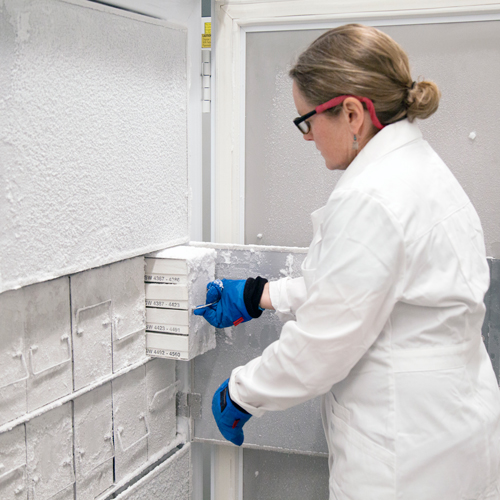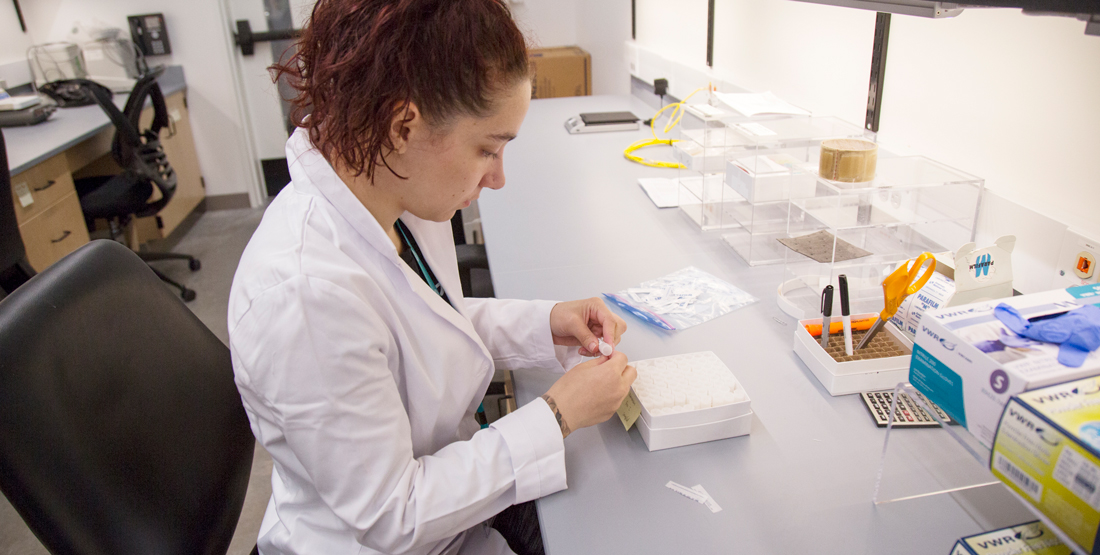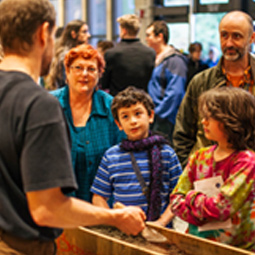General Philosophy
We are committed to a program of general collecting that provides voucher specimens for our tissues. Tissues without voucher specimens and collection data are of more limited use because researchers have no way to verify identification or to pursue complementary studies of anatomy, geographic variation in morphology, etc.
Our collection serves two communities: our first priority is to provide a resource for graduate students and other researchers at the University of Washington. Thus, tissues that were collected with particular research projects in mind or those that could form the basis of a PhD project might not be available for loan or may be subject to more stringent loan conditions (see below.)
The Burke also provides tissue loans to qualified researchers at other institutions. All those requesting loans are expected to abide by our Tissue Policy (see below.) In return, the Burke will absorb the high cost of obtaining, cataloguing and maintaining tissues for general use by the research community.
Tissue Policy
Requesting a Tissue Loan
All requests for tissues must be received in writing; the GRC manager is the primary contact for loans. Researchers should provide detailed information about their proposed project and need for tissues, formally agree to our Loan Conditions, and be prepared to pay applicable fees or shipping expenses (see below for details.) Loans are subject to approval by the GRC collection manager and appropriate curators.
Contact Information
Sharon Birks, Collection Manager
sbirks@uw.edu
Information Requested
Before receiving loan approval, researchers must provide the following information in their application letter:
- Description of Project. Applicants should provide a complete description of the research project, including research goals, scientific rationale, molecular techniques, the lab where the research is to be completed, and experience of the researcher or expertise available from lab colleagues.
- List of Samples Requested. Please use our online Ornithology database, Mammalogy database, or herpetology database (accessible through the Arctos website by selecting “UWBM Herp” from the Collection drop-down menu) to compile a preliminary list of desired tissues, noting UWBM#, scientific name, and tissue number for each requested sample. Researchers who need more detailed specimen data to plan their study may request this be sent to them.
- Relative Contribution of Burke. Researchers should indicate how much genetic material they already have in hand, either from their personal collecting effort or through requests from other institutions. In most cases, researchers should not expect the Burke to provide them with all the tissues necessary for a dissertation or other large project.
- Statement of Agreement of Conditions of Loan. Researchers must agree to the Burke Museum GRC Loan Conditions (see below,) and make a statement to that effect in their request. Loan Conditions will also be listed briefly on the loan packing slip or invoice, which researchers are requested to sign and return (pdf via email is OK) upon receipt of tissues.
Loan Conditions
-
Tissue Use. Researchers may use loaned tissues and their extracts only for the approved project. If you wish to change the scope of the project or share tissue or DNA with other researchers, you must obtain prior approval from the Burke. Normally, we do not expect you to return extracts or leftover tissue, but in the case of rare tissues we may request that you do so.
-
Permits. If a loan is approved, requesters must provide appropriate permits for transport or import.
Loans within the U.S.:
U.S. researchers who request tissues obtained outside the U.S. will need to provide a copy of their USDA transport permit before tissues can be shipped. These permits may be obtained from the USDA Animal and Plant Health Inspection Service.
International Loans:
- Import permits: Foreign researchers must include any import permit required by their government. If no permit is needed, the researcher must state so in writing at the time of the tissue request.
- Export permits: The Burke will arrange appropriate U.S. export permits, which require 1 to 2 weeks to process. Export of CITES listed species will be greatly facilitated if the receiving institution can provide a Certificate of Scientific Exchange.
- Export permit fees: The U.S. Fish and Wildlife Service charges a premium inspection fee for exports that include any "protected" species, including migratory birds (MBTA,) marine mammals (MMPA,) CITES species, and endangered or threatened species (ESA.) As of 2019, this fee is $93 per shipment; we ask those requesting loans cover this fee.
- Direct links for determining protection status for species of interest:
-
Acknowledgments and Publications. Researchers who use our collection for publications and reports should acknowledge the "University of Washington Burke Museum (UWBM)" and are asked to provide PDF copies of their publications. Researchers should reference specific tissues by listing the tissue’s museum catalog number (e.g., UWBM 54326) in addition to its scientific name. If sequences derived from tissues are submitted to a database (e.g., GENBANK), the UWBM# and basic voucher specimen information such as location and date should be included.
Service Fee, Exchanges, and Shipping
Because collecting and maintaining tissues is difficult, expensive and consumptive, we request users provide some evidence of reciprocal benefit to the Burke and/or other museum collections. Currently, we either charge a $25 per tissue service fee (lower for loans of > 10 tissues) or request exchange of specimens or services.
The tissue fee serves several purposes:
-
It encourages thoughtful use of and appreciation of the collection. As laboratory techniques improve, the gap in effort between obtaining tissues and analyzing them is widening into a gulf, particularly for rare or hard-to-obtain species. Our tissue collection is heavily used—typically we loan 1,500 to 2,000 tissues per year. Requesting a fee is one way to encourage researchers to evaluate their use of tissue collections, to keep their requests reasonable, and to contribute to building collections when they can.
-
It spreads the cost of tissues more evenly among users. As molecular labs become widespread, many researchers who do not have the resources or desire to collect specimens still need access to tissues. The fee allows such users to support collections and to receive loans routinely, without necessarily being asked to respond with exchanges of specimens or tissues.
-
It provides valuable financial support. While laboratory research is generally relatively well funded, museums still struggle to obtain basic funding for and recognition of the importance of their collections. Cryogenic storage for tissues is expensive to maintain, and loans are a labor-intensive and often expensive to process. Fees make a valuable contribution towards maintaining the collection and ensuring that it will continue to be available in the future.
Alternative to the service fee, researchers may request an exchange or collaboration. The following may be considered appropriate for exchange:
- Salvaged or collected frozen whole animals
- Tissues requested by the Burke for a particular research project
- Equivalent services provided by other museum collections
For example, in cases of requests by curators at other institutions that also loan tissues routinely, the fee may be waived. In addition, the Burke reserves the right to determine whether an exchange is desirable and of comparable value. Exchanges of tissues or blood without vouchers are generally discouraged. When unusually large numbers of tissues are requested, collaboration or co-authorship may be appropriate; this must be negotiated on a case-by-case basis.
Shipping Method: Tissues will be sent in 95% ethanol, unless otherwise specified, and via courier so that the shipment can be tracked. Loaned tissues will be accompanied by a detailed packing list.
Loans within the U.S.: Most loans will be sent at our expense unless the service fee is waived, in which case we will ask for a FedEx account number to cover shipment costs. For requests within the U.S., we can also accommodate researchers who prefer loans sent on dry ice, but will charge an additional fee.
International loans: Courier fees for international shipments (currently ca. US$50-100 for a typical tissue loan) will be covered by those requesting the loan.
For more information, contact us.

Support Genetic Resources
Your gift makes it possible! We couldn't do what we do without generous donor support for collections care, research and public outreach.

